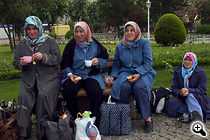
A woman’s group is stirring controversy in Turkey with a campaign to elect headscarf-wearing women to parliament. Some of the fiercest opposition to the initiative is coming not from secularists, but from religious conservatives.
With just over two months to go before Turkey’s parliamentary balloting, the country’s political leaders are starting to assemble party lists of candidates. The number of seats any given party wins is determined by the percentage of the vote it receives. The higher an individual candidate is on a party list, then, the better the odds of that person becoming a MP.
Turkish women’s groups have been traditionally divided along ideological lines. But they are uniting behind the initiative, launched in March by a non-partisan group called Women Meet Halfway, to have women who wear headscarves placed high enough up on party lists so that they stand a decent chance of being elected.
“No headscarves, no vote,” shouted sixty-odd women who gathered outside the parliament building in Ankara on April 8. “As it stands, our democracy is half-baked”, said the group’s spokeswoman, Nesrin Semiz. “Two-thirds of Turkish women cover their heads. Not one of them has a seat in parliament.”
The campaign is generating an ambiguous reaction from an electoral constituency that, at least at first glance, would appear to be a natural ally: religiously conservative men.
In general, the conservative press is trying to ignore the campaign. Those columnists who have addressed it have tended to be disparaging. A columnist in the mass-market conservative daily Zaman, Mehmet Kamis, has described the headscarf issue as “meaningless.”
“These elections are a vital opportunity for Turkey to create the foundations of civilian democracy,” he wrote on April 2. “Why put that at risk with all this talk of headscarves.” Kamis was alluding to the main plank of the governing Justice and Development Party’s (AKP) election campaign: the promise of a new “civilian” constitution.
The AKP has Islamist roots, and the wives of some top party leaders wear headscarves in public, but those same party leaders make no secret of wanting to win more than two-thirds of the seats in parliament. Such a total would allow the AKP to push through a new constitution on its own. Party leaders worry that strong backing for the headscarf issue could complicate their electoral goal. Yet, they also know that distancing themselves from the issue could create political problems.
Fehmi Koru, an influential political commentator close to Turkish President Abdullah Gul, is perhaps representative of the AKP position of finessed support for the headscarf campaign. “People are no longer content with a democracy limited to visiting a polling booth,” he said. “They want to see deputies who live and think like them.”
The headscarf issue has been a source of particular contention in Turkish politics in the recent past. In 1999, Merve Kavakci, the first deputy in Turkish history to enter parliament wearing a headscarf, was ejected by her colleagues amid an uproar. In 2008, the AKP’s attempt to lift a ban on headscarves at universities triggered a closure case against it.
Supporters of Women Meet Halfway’s campaign think fears of a repeat of 2008 or 1999 are unfounded. The Constitutional Court, which narrowly voted against closing the AKP in 2008, has since been packed with justices sympathetic to the governing party, campaign member Hilal Kaplan points out.
A secular party that lobbied hard for the court’s intervention against the AKP in 2008, meanwhile, has signaled that it will take no action, if women wearing headscarves are elected to parliament.
In any case, says Fatma Bostan Unsal, a founding member of the AKP who wears a headscarf and has put her name forward as a candidate, there is nothing in parliamentary regulations about headscarves — only a requirement for women to wear “suits.” Turkish courts stripped Kavakci of her position in 1999 not because of her headwear, but because she had become a US citizen “without the permission of the Turkish authorities.”
Unsal says she will run as an independent if the AKP doesn’t support headscarf-wearing candidates. With just under nine weeks to go until Turks go to the polls, she still doesn’t know what colors she will be presenting herself under: Prime Minister Recep Tayyip Erdogan, the arbiter of who rises and who falls in the AKP, is keeping his options wide open.
But a ferocious attack last week on the headscarf campaign by one of Turkey’s most prominent Islamist intellectuals has led some women to wonder whether all the high-minded talk of the need to protect the AKP from a repeat of 2008 isn’t hiding something rather less savory. Writing in Zaman on April 2, Ali Bulac described the campaign’s leaders as “fifth columnists … working from the start to destroy the Islamist movement from within.”
Supporting the use of the headscarf is “a religious obligation of every believing man and woman,” Bulac went on. But the campaigners “look down their noses at their own neighborhoods,” and “have stripped the headscarf of its religious significance, reducing it to a simple issue of human rights inspired by feminism.”
Bulac’s article drew a sharp response from one of the campaign organizers. “Apparently the reverence some conservative men feel for their covered womenfolk is dependent on them [women] deferring to their husbands and betters, and minding their own business,” Hilal Kaplan wrote in the conservative daily Yeni Safak on April 4. “But if that is what they understand by [the Islamic concept of men’s duty to protect women] then, inevitably, they are going to end up being told ‘thanks, but no thanks.'”
via Turkey: Religious Conservatives Confront Headscarf Dilemma as Election Looms | EurasiaNet.org.